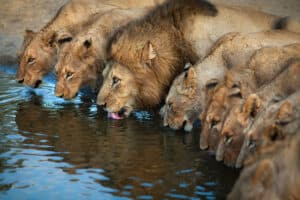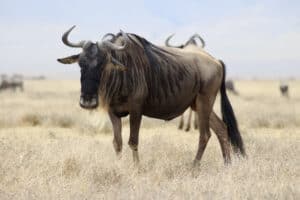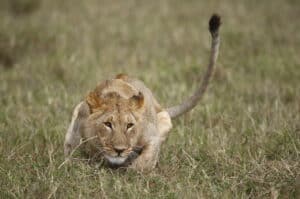Want to see something adorable? Then you must see this video of a baby lion cub loving on its father! The video begins with the young cub walking alone. Then we see that it’s approaching a massive male lying peacefully in the shade. The cub surprises its father, who didn’t hear it approaching. The visibly startled adult settles down when he realizes it’s just a cub.
The cub proceeds to rub its head along the father’s face. The male grumbles about the interaction and shows his teeth. Although the father expresses his distaste for the young one’s affection, he allows the cub to leave the encounter without injury. Let’s learn more about lion social behavior before watching the video at the end!
Watch the Adorable Lion Cub Snuggle its Father Below!
Lion Social Behavior Explained
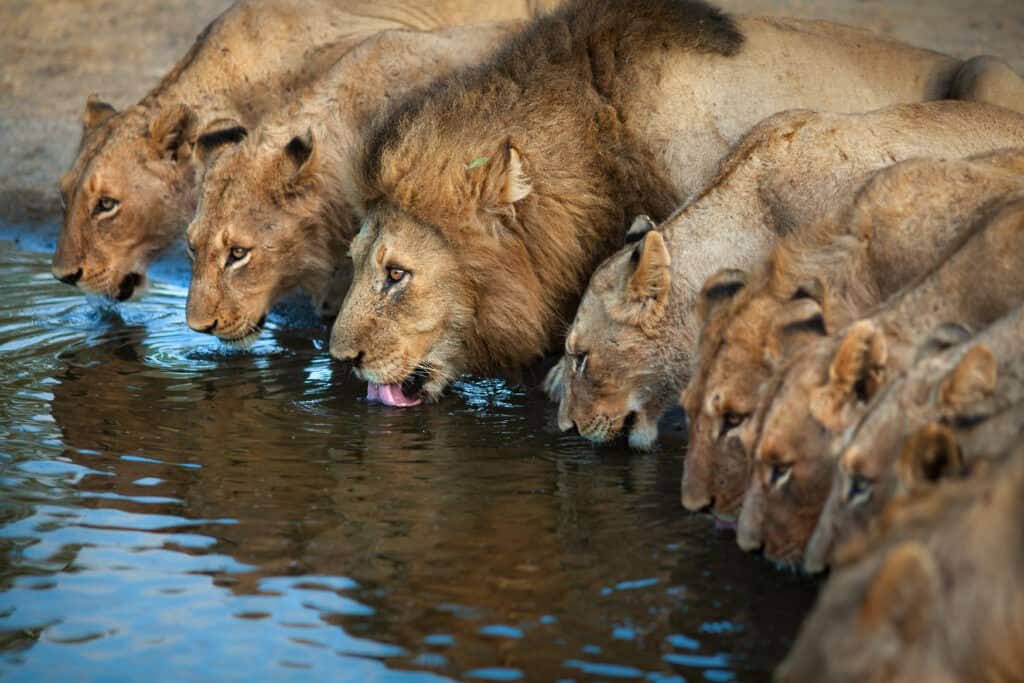
Lions live in prides consisting of adult females, their cubs, and a few adult males.
©Henrico Muller/Shutterstock.com
Lions display complex social behavior that sometimes confuses those who see their interactions. Let’s learn more about the different aspects of lion social behavior below!
Group Living
A lion pride (or family group) usually consists of several related female lions (lionesses), their cubs, and a coalition of males. Contrary to popular belief, single males rarely lead prides on their own. Lionesses typically display affection for their pride mates. They lounge together and clean one another. Females typically stay with the same pride their entire lives. Occasionally, exceptions occur when females become separated from their pride and get accepted into a new one. However, these conditions are quite rare.
The male cubs are driven out of their pride by their mothers, sisters, aunts, and the resident dominant males when they begin to reach sexual maturity. This instinct, called dispersal, allows the bloodlines to keep from crossing too often and reducing the gene pool. One study showed that dispersal is sometimes delayed due to certain pride relationships.
In addition to that, coalitions rarely maintain control of the same pride for very long. This is due to rival males chasing them off or even killing them. Again, this prevents the same males from breeding with their own daughters. Lion social behavior like this essentially keeps the species healthy.
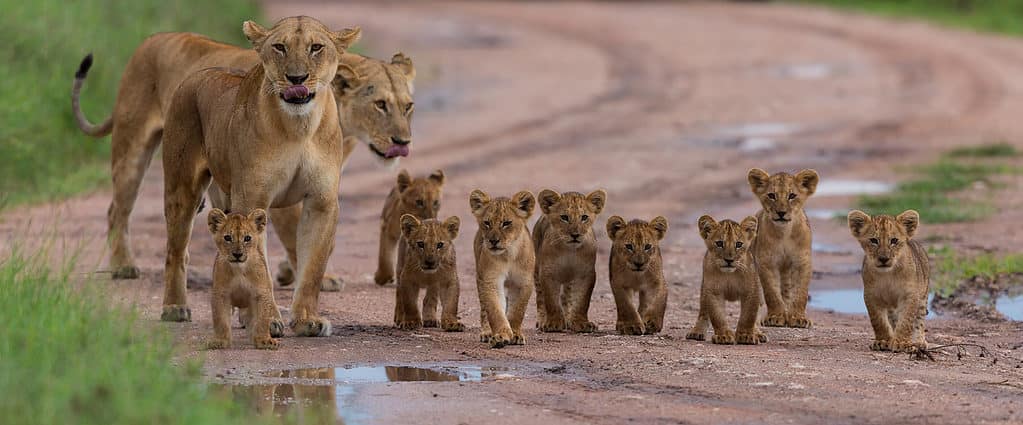
Lionesses in a pride work together to raise the cubs.
©Kirill Dorofeev/Shutterstock.com
The Crèche
The crèche is an essential part of lion social behavior. Lionesses with cubs of similar age regularly form these small nursery groups. They live closely with one another and even nurse each other’s cubs. This usually occurs with the most closely related females. These close-knit groups protect the cubs together, especially against the threat from adult males, which we’ll discuss next. Cubs also face risks from other predators, such as hyenas and leopards, who strive to take out their competition before they grow up.
Unfortunately, only one in eight cubs survives to adulthood. That’s why crèches are so important. Larger crèches with strong females have better chances of keeping their cubs alive.
Infanticide: The Horrifying Lion Social Behavior
Infanticide is a gruesome part of lion social behavior. Amazingly, 25% of all cub deaths are attributed to infanticide. Most people have heard that male lions kill as many young cubs as they can when they take over a new pride. Scientists believe that’s because lionesses do not mate again for up to 18 months if their babies survive. If they lose all their cubs, they will come into heat (that is, be ready to breed) within days. While it may seem counterproductive to weaken the pride by slaughtering its future hunters, this allows the new male to spread his genetics. One lion coalition killed as many as 100 other lions, including males, females, and cubs, during their 16 years together!
Some researchers suggest infanticide may not be as common as originally thought. In fact, one study (published in 1998) proposed that more cubs die due to maternal abandonment and starvation than by incoming dominant males. It also stands to reason that with lionesses already pregnant, when the new males take over, they could easily birth their offspring without incident. The male lions are not capable of knowing which cubs they actually sired, while females know which cubs are their own.
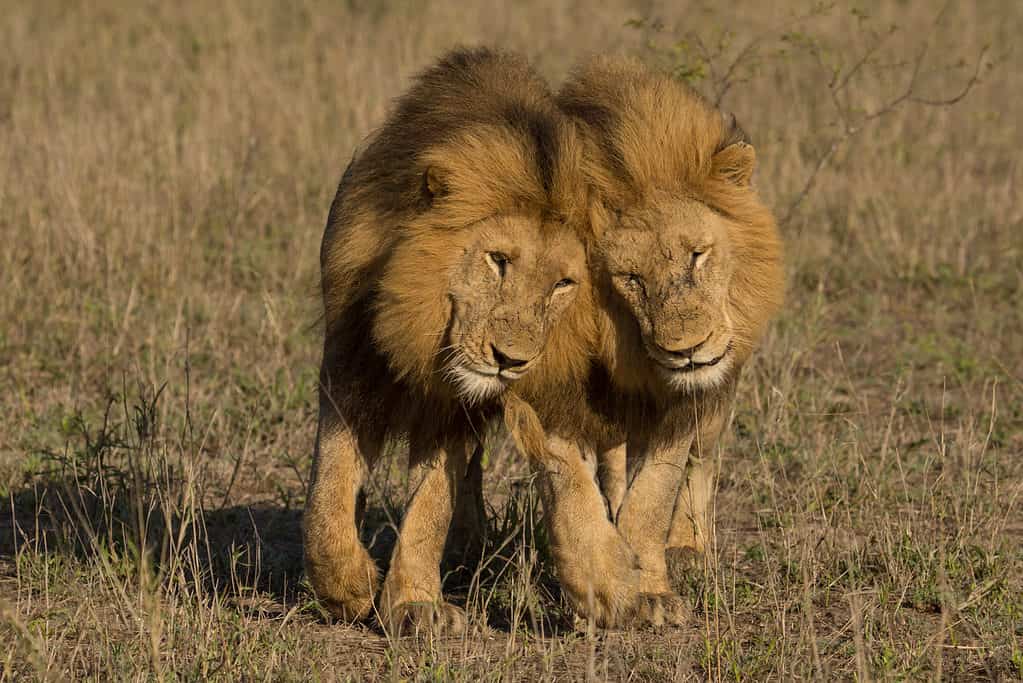
Male lions form coalitions, often with their brothers, to maintain territory and control prides.
©Maryke Scheun/Shutterstock.com
Maintaining the Territory: The Lion Social Behavior Not Just for the Boys
Obviously, male lions are extremely territorial. Did you know lionesses are, too? That’s right! Females will attack and kill intruding females on sight. This sometimes even occurs when a lost female returns to the pride. That’s because the female’s instinct is to protect their own pride members only. A female returning to the pride may no longer smell like them and be rejected.
Not only that, but male lion coalitions protect their territories with fierce determination. Any lion trying to enter the territory is met with teeth and claws. Defending their territory also includes protecting the pride from other predators that seek to kill cubs or steal food. Male lions roar to tell others all around that they are in charge here. A lion’s roar can be heard as far as three miles in any direction!
Final Thoughts on Lion Social Behavior
While it may seem strange to us, lion social behavior developed as a way for them to survive. Living in a pride allows them greater safety and success in hunting. Male lion coalitions live by the same principle – safety and strength in numbers! Working together to raise cubs and hunt helps the females survive, while infanticide helps rival males continue their bloodlines. Have you witnessed any strange animal social behaviors?
The photo featured at the top of this post is © GUDKOV ANDREY/Shutterstock.com
Thank you for reading! Have some feedback for us? Contact the AZ Animals editorial team.




